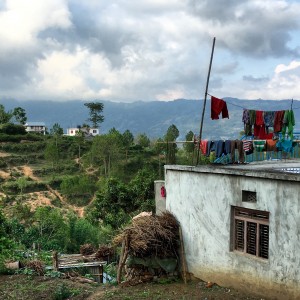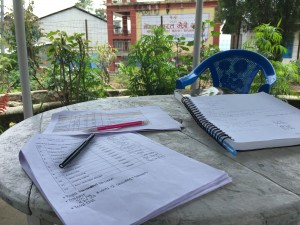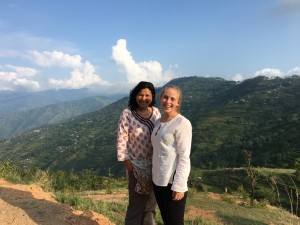I like things arranged just so and things done a certain way. The plates at home need to stacked such that no two plates of the same color are touching. When I go to frozen yogurt (which I would probably kill for right now) I go through the toppings carefully and pick out the right ratio of blue to green to white to red gummy bears and just the right brownie piece – and I even count the M&Ms that go on top (either five or ten, I like things done in fives and tens). I color code my planner according to the color each event makes me feel. I like to plan my day hour by hour and I even allocate time for the unexpected. I’ve learned to make it a joke (hahaha I’m just really particular) so it comes off as quirky rather than neurotic. I try to make it seem like I just know what I want instead of what it really is: an intense need for order and control.
I don’t want to make it seem like I’m a stick in the mud, I promise I’m not that bad. I try to be flexible with others and I make a conscious effort to keep an open mind and listen to others. I’m just as type A as they come. I’ve always convinced myself that kind of intensity is what it takes to be successful and I surround myself with people who function a very similar way. One of my best friends laughed when I told her I was going to Nepal – and many people have echoed the same sentiment – it’s very different there. Time is slow. Schedules are fluid. Meetings aren’t set. Electricity sometimes goes out for days at a time. Buses break down. There’s no salami. Being high intensity and high strung won’t get you very far.
Dhankuta is definitely different than anything I have ever experienced. The beauty is unmatched.
Everybody was right when they said things were different. I’m over a week into my work here and I’m still adjusting to the pace of everything. The internet is slow and goes out often, which makes it unreliable. Communication is developing in Nepal with the increased availability of cell phones and Ncell data flash drives, but it is just that: developing. Many don’t have computers or internet in their homes, so much of the communication here takes place by phone or in person. Many people come through the office during the day to discuss politics with Indira, most without an appointment. I can’t even imagine the affect that this lack of instantaneous and dependable communication would have on the American workplace, but for now there is no other option in Dhankuta.
It’s not just the internet that goes down often, it is the electricity altogether. Nobody knows when it will go out and nobody knows when it will come back on. On multiple occasions, I’ve woken up extremely excited to read an email from my mom or dad only to find there is no electricity. I’m beginning to learn that even important emails will still be there when the lights go back on, as will anything else I am working on (like the meal I’m eating). There’s no way to plan around it or work it into your daily schedule; when the lights go off, the lights go off. You can only shrug and wait and pray that you remembered to charge your computer.
Luckily, I can do some of my work outside! Here I’m working with receipts and the budget from a previous camp.
More seriously, I didn’t realize the power of language until I lost the ability to effectively communicate. Indira speaks basic English, but not enough for me to freely speak with her. If there is something important to discuss regarding Care Women Nepal, the issue at hand often gets run by Yunesh or Iain before it is finalized (my work plan, the budget, etc.). There is a staff member a little bit older than me who comes into the office every workday between 10 and 5. She speaks conversational English and I consider us friends, and she is capable of translating the exchanges that happen between Indira and me during the workday. I can’t assert myself to the extent that I can at home, though. I listen, I observe, and I communicate what is important. The work gets done and the project moves forward.
I can’t completely or easily express myself and my ideas to those around me – especially outside of the workplace. My spare time is spent alone either reading, writing, or listening to podcasts. I’ve taken to body language and quiet, short sentences when I talk with people. I found a tarantula in my room the other night and I was trying to tell Indira. I showed her a picture that I took of the spider, but I couldn’t really explain the situation.
The hideous beast
Indira: Outside?
Me (pointing at the picture then to my room): No no, in my room! I saw this in my room last night.
Indira: This was outside.
Me: My room!! (furious pointing) It was in my room last night!
Indira: In bathroom last night? You saw this in the bathroom?
Me: No, my room. A tarantula!
Indira: No no, it’s a spider. Why you scared?
Me: A tarantula is a kind of spider. (imitating a crawling spider with my fingers and then shivering) I don’t like them.
Indira: * laughing a little * Why? No harm.
Me: Yes, no harm, but scary.
She later brought home a can of some kind of bug killing spray to spray in my room, God bless her kind soul. I posted the picture of the tarantula to Instagram and Facebook and I finally got the validation and support I needed. Although comforting to hear that my fear was very real and shared by many of my friends, it made me a little sad that I was so far away from those who could really understand me.
Me and Indira while looking at a work associate’s property
I’ve had to suspend a large part of who I am while being in Nepal. This large part of me, the intense type A part of my personality, is not always my favorite part of myself. Over the course of two weeks, I have learned to give up control even in small degrees. Whether it be that the busses or cars don’t have seatbelts no matter how much it terrifies me, that an important meeting that was supposed to happen today is just not happening, that the electricity is out until it comes back on, or that there are mice who scurry around the perimeter of the office I work in.
As a loud verbal processor and extrovert, I am learning how to focus inwards and process differently. I am learning how to be alone. Things in Nepal will be how they are no matter how particular I am about them. I may always count the M&Ms I put on my frozen yogurt or color code my planner, but learning to let go of this part of my identity, even for ten weeks, will be one of the best things I could ever do for myself.
Posted By Morgan Moses
Posted Jun 11th, 2016






259 Comments
Sally Hedman
June 11, 2016
Hi Morgan, Your post is so articulate. You are an excellent writer. And to be so self-aware of who you are is refreshing. I had no idea you counted your M&Ms. Or that you are so focused and driven. What a fabulous experience you must be having. It’ll probably look more fabulous to you when you don’t have mice and tarantulas traipsing through your life and the electricity stays on. I’m going to start reading from the beginning now. Keep on being the Type A gal in a chaotic world—with a good measure of flexibility thrown in. I admire your spunk and courageous spirit.
Sally
Rita
June 12, 2016
Glad to read that you are slowly adjusting to your new life in Nepal. Call or email us whenever you need, we are here to support! I would also like to learn more about your work with Care Women Nepal, maybe write more about it in your future blog posts? Keep up the good work, Morgan!
Ai Hoang
June 24, 2016
Hi Morgan, this was such a lovely read with a great takeaway! Good luck with everything.